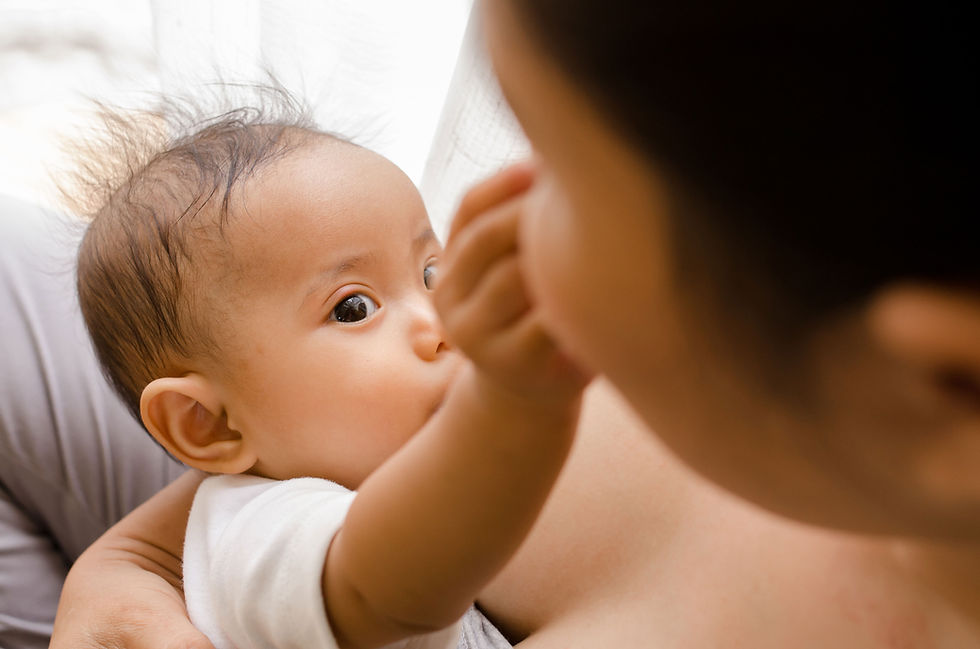Cup feeding
- mfalqurashi
- Dec 8, 2024
- 4 min read
Updated: Dec 10, 2025
Cup feeding for babies over 6months
For babies under six months, milk is their only source of nutrition, and between 6months and 12months milk (whether breast or formula) milk is still very important alongside complementary solid foods. Milk during this period is not just for the calcium, but also for energy, macro and micronutrients.
This article focuses on older babies (6 months+) who need to continue to drink milk, but are not feeding at the breast and need to take expressed milk, formula or water.
Some useful sources of information include First Steps Nutrition and the NHS website (links below). They provide an approximate guide on the recommended milk intake for different age groups. It might be that a baby transitioning from the breast may be vulnerable to taking too little or too much milk from the ‘new way’ of drinking.
For solid foods, First Steps Nutrition link is an excellent resource focusing on getting enough of the right foods (for babies over 6 months) to ensure a baby’s growth and development needs are met. They break down the information into age periods.
The advantage of cups is that after a baby is twelve months it is advisable to move away from bottles anyway. An open cup is easy to clean and is arguably better for dental development (NHS, 2019).
The type of cup used is an issue to consider. There are hygiene concerns over sippy cups - they can build up germs and black mold because they are tricky to thoroughly clean. Additionally those with spouts and straws can increase risk of cavities in teeth as milk is concentrated around the back of the front top teeth. In this regard, an open cup is preferable.
*If you decide to introduce an older baby to a bottle then it is important to use the paced bottle feeding method-Responsive bottle feeding If a baby is at nursery or being looked after by a childminder/grandparent then they can be asked to use this method.
Some parents find it very tricky to transition a baby from breast to cup, or bottle to cup, and understandably worry about the baby getting enough milk. Here are some techniques that can be helpful:
For cups:
● For an older baby who is sitting unaided, let him play with the cup in the bath with some milk/water in. This helps make it fun with no pressure to drink, and it also helps parents who are nervous about mess!
● It may be helpful to use something from their parent (like a t-shirt) to wrap baby in so he can smell them if another caregiver is providing milk.
● Sometimes the stress the parent is feeling can be picked up by a baby. Even if the parent isn't feeling calm about things, putting on their best ‘calm’ act may help. Even pretending you are not bothered whether they try the drink may help!
● Try putting the drink in your cup! An older baby might be pleased to use a grown ups cup!
● A brightly coloured beaker/cup that baby hasn't seen before and wont have any other associations with can work well - he might see it as a new ‘toy’ and try it out that way.
● Let him copy you drinking from a beaker - make it a fun game.
● Try little and often, rather than focussing on bigger feeds. An ounce or two here and there will soon add up. Try offering before he's too hungry, and if a parent is reducing breastfeeds and replacing them with formula/expressed breastmilk, then trying before his usual breastfeeding time may help.
Just as an aside, don’t leave babies unattended with a cup as if it has a fast flow, or is an open cup, he could choke. Help him hold a beaker if the flow is fast. Gradually he will get used to handling a cup by himself. It is important that a baby drinking from a cup is upright and not laying down or reclined.
If your over 6 month old is not consuming enough milk then it is possible to encourage greater milk intake by mixing the breastmilk or First Stage formula into their yoghurt. Alternatively make milk based foods such as rice pudding, porridge, custards etc (being cautious about sugar content). Keep an eye on his wet and dirty nappies to ensure he is well hydrated.
If a parent is cutting down on breastfeeds with a view to weaning from the breast then it is important to give lots of extra love and cuddles to help with the transition from lots of breast (and therefore snuggles) time. This will help him adjust to the change.
If you are providing any formula at all then it's important that it is First Milk only up until 12 months. After 12 months, a formula fed baby can have full fat cows milk. More information on the reason for this, see the First Steps Nutrition website.
It is also important that any formula is being made up safely to prevent infection and also to ensure the ratio of powder to water is correct. See How to make up baby formula - NHS
Useful links:
Lucy Lowe IBCLC (International Board Certified Lactation Consultant)

%20(Landscape))-2.png)





Comments